Numan Company: Analysis of the UK Legal System for Business Operations
VerifiedAdded on 2022/04/11
|25
|7969
|32
Report
AI Summary
This report analyzes the UK legal system, providing a comprehensive overview of its structure and key components. It begins with an introduction to the Numan Company, outlining its business model and the legal context in which it operates. The report then delves into the different types of legal systems worldwide, followed by a detailed examination of the UK legal system, including its court structure and the functions of law. A significant portion of the report focuses on the sources of UK law, such as common law, equity law, delegated legislation, customs, conventions, Acts of Parliament, and European Union Law. Each source is explained with examples, providing a clear understanding of their application and impact. The report also highlights the differences between criminal and civil law. The report is designed to offer insights into the legal framework relevant to businesses, like Numan Company, operating in the UK, offering advice on legal compliance and growth strategies.
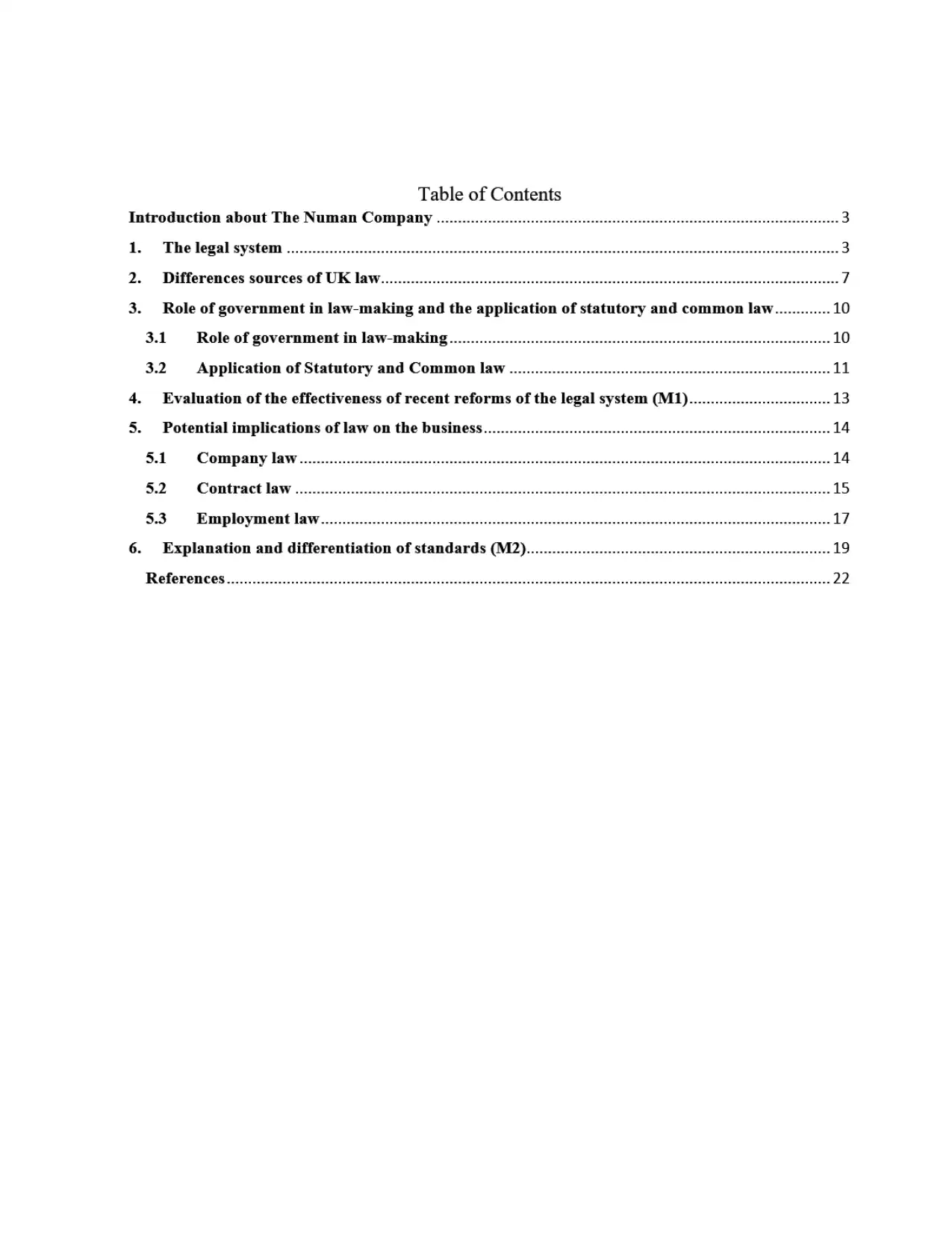
Paraphrase This Document
Need a fresh take? Get an instant paraphrase of this document with our AI Paraphraser
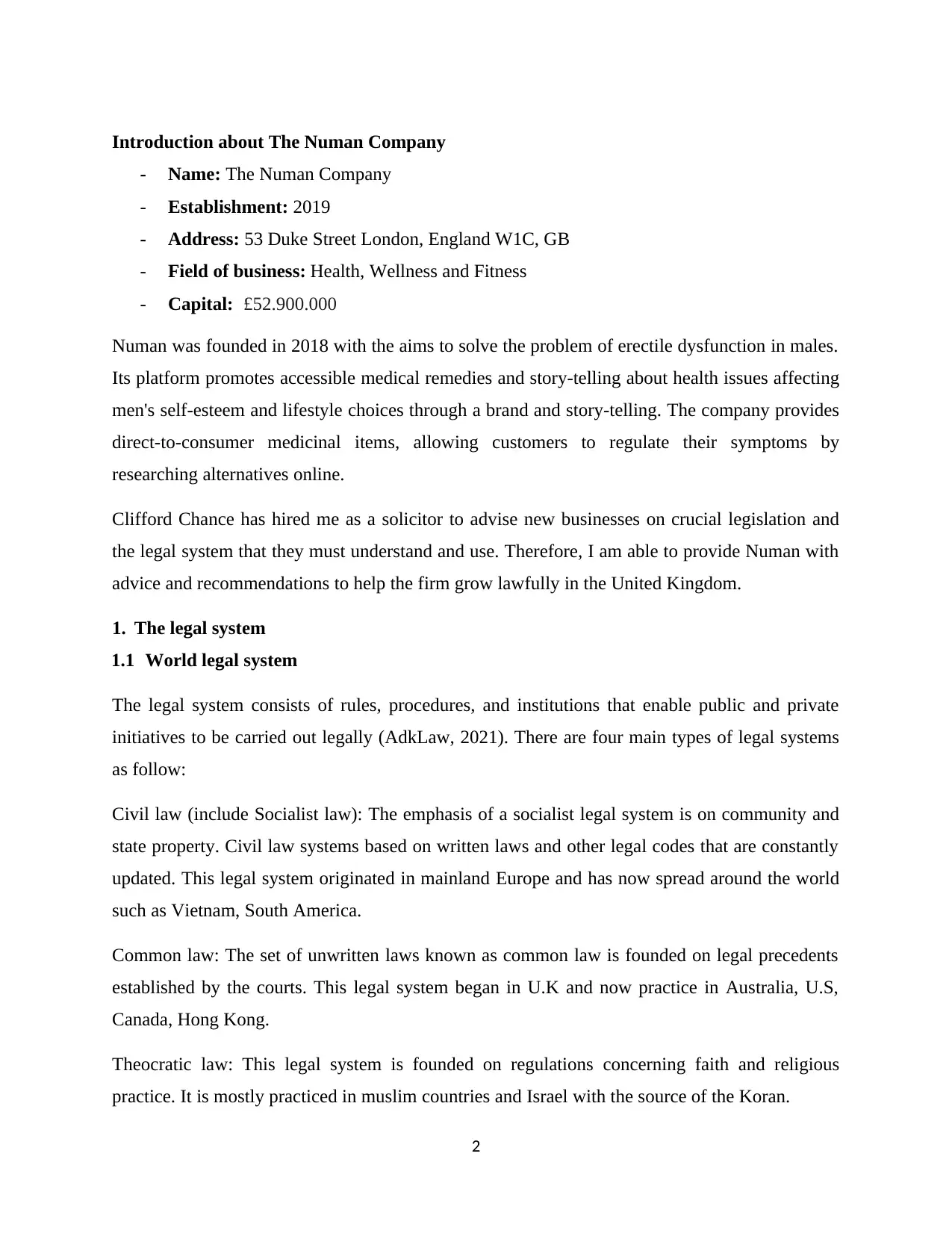
Introduction about The Numan Company
- Name: The Numan Company
- Establishment: 2019
- Address: 53 Duke Street London, England W1C, GB
- Field of business: Health, Wellness and Fitness
- Capital: £52.900.000
Numan was founded in 2018 with the aims to solve the problem of erectile dysfunction in males.
Its platform promotes accessible medical remedies and story-telling about health issues affecting
men's self-esteem and lifestyle choices through a brand and story-telling. The company provides
direct-to-consumer medicinal items, allowing customers to regulate their symptoms by
researching alternatives online.
Clifford Chance has hired me as a solicitor to advise new businesses on crucial legislation and
the legal system that they must understand and use. Therefore, I am able to provide Numan with
advice and recommendations to help the firm grow lawfully in the United Kingdom.
1. The legal system
1.1 World legal system
The legal system consists of rules, procedures, and institutions that enable public and private
initiatives to be carried out legally (AdkLaw, 2021). There are four main types of legal systems
as follow:
Civil law (include Socialist law): The emphasis of a socialist legal system is on community and
state property. Civil law systems based on written laws and other legal codes that are constantly
updated. This legal system originated in mainland Europe and has now spread around the world
such as Vietnam, South America.
Common law: The set of unwritten laws known as common law is founded on legal precedents
established by the courts. This legal system began in U.K and now practice in Australia, U.S,
Canada, Hong Kong.
Theocratic law: This legal system is founded on regulations concerning faith and religious
practice. It is mostly practiced in muslim countries and Israel with the source of the Koran.
2
- Name: The Numan Company
- Establishment: 2019
- Address: 53 Duke Street London, England W1C, GB
- Field of business: Health, Wellness and Fitness
- Capital: £52.900.000
Numan was founded in 2018 with the aims to solve the problem of erectile dysfunction in males.
Its platform promotes accessible medical remedies and story-telling about health issues affecting
men's self-esteem and lifestyle choices through a brand and story-telling. The company provides
direct-to-consumer medicinal items, allowing customers to regulate their symptoms by
researching alternatives online.
Clifford Chance has hired me as a solicitor to advise new businesses on crucial legislation and
the legal system that they must understand and use. Therefore, I am able to provide Numan with
advice and recommendations to help the firm grow lawfully in the United Kingdom.
1. The legal system
1.1 World legal system
The legal system consists of rules, procedures, and institutions that enable public and private
initiatives to be carried out legally (AdkLaw, 2021). There are four main types of legal systems
as follow:
Civil law (include Socialist law): The emphasis of a socialist legal system is on community and
state property. Civil law systems based on written laws and other legal codes that are constantly
updated. This legal system originated in mainland Europe and has now spread around the world
such as Vietnam, South America.
Common law: The set of unwritten laws known as common law is founded on legal precedents
established by the courts. This legal system began in U.K and now practice in Australia, U.S,
Canada, Hong Kong.
Theocratic law: This legal system is founded on regulations concerning faith and religious
practice. It is mostly practiced in muslim countries and Israel with the source of the Koran.
2
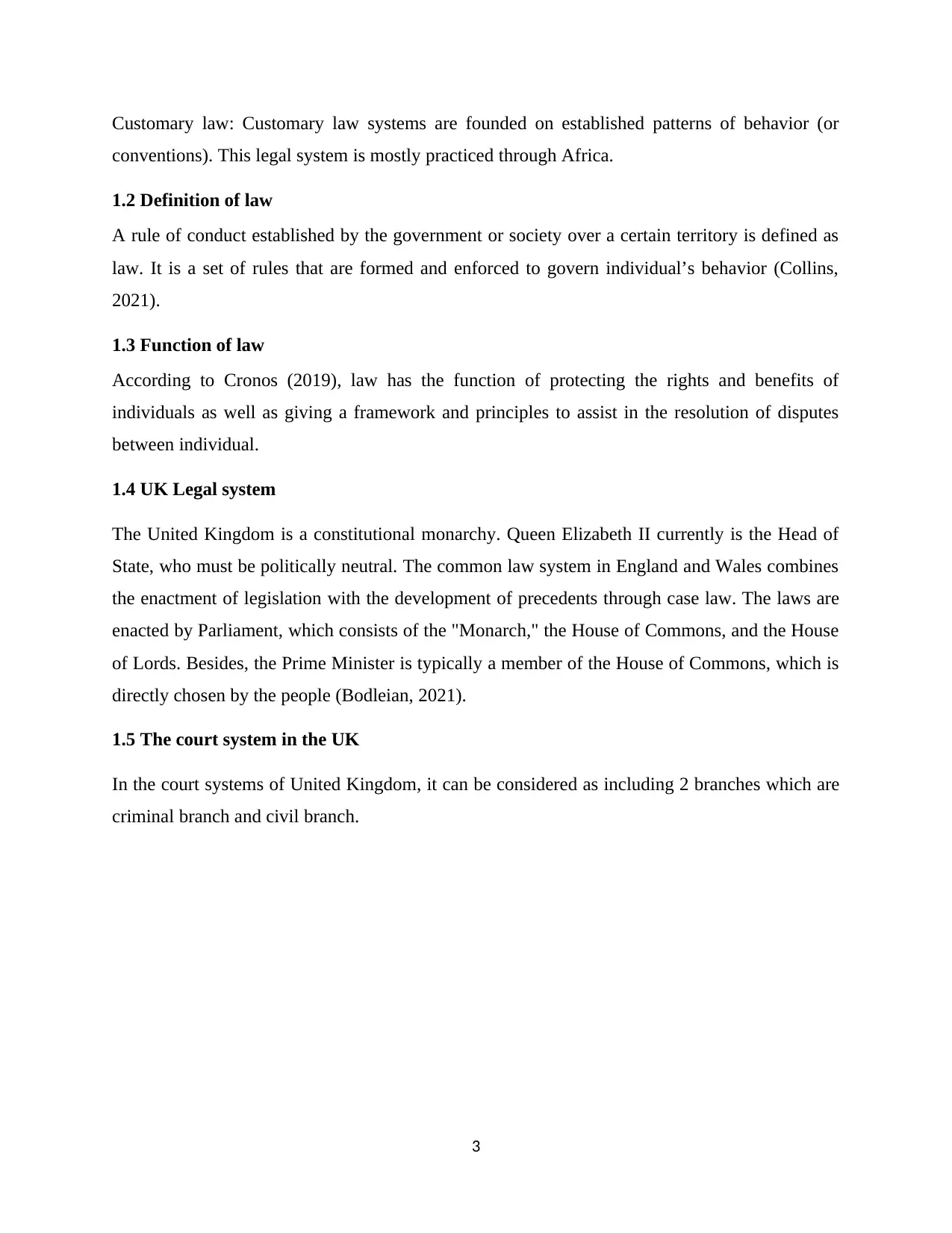
Customary law: Customary law systems are founded on established patterns of behavior (or
conventions). This legal system is mostly practiced through Africa.
1.2 Definition of law
A rule of conduct established by the government or society over a certain territory is defined as
law. It is a set of rules that are formed and enforced to govern individual’s behavior (Collins,
2021).
1.3 Function of law
According to Cronos (2019), law has the function of protecting the rights and benefits of
individuals as well as giving a framework and principles to assist in the resolution of disputes
between individual.
1.4 UK Legal system
The United Kingdom is a constitutional monarchy. Queen Elizabeth II currently is the Head of
State, who must be politically neutral. The common law system in England and Wales combines
the enactment of legislation with the development of precedents through case law. The laws are
enacted by Parliament, which consists of the "Monarch," the House of Commons, and the House
of Lords. Besides, the Prime Minister is typically a member of the House of Commons, which is
directly chosen by the people (Bodleian, 2021).
1.5 The court system in the UK
In the court systems of United Kingdom, it can be considered as including 2 branches which are
criminal branch and civil branch.
3
conventions). This legal system is mostly practiced through Africa.
1.2 Definition of law
A rule of conduct established by the government or society over a certain territory is defined as
law. It is a set of rules that are formed and enforced to govern individual’s behavior (Collins,
2021).
1.3 Function of law
According to Cronos (2019), law has the function of protecting the rights and benefits of
individuals as well as giving a framework and principles to assist in the resolution of disputes
between individual.
1.4 UK Legal system
The United Kingdom is a constitutional monarchy. Queen Elizabeth II currently is the Head of
State, who must be politically neutral. The common law system in England and Wales combines
the enactment of legislation with the development of precedents through case law. The laws are
enacted by Parliament, which consists of the "Monarch," the House of Commons, and the House
of Lords. Besides, the Prime Minister is typically a member of the House of Commons, which is
directly chosen by the people (Bodleian, 2021).
1.5 The court system in the UK
In the court systems of United Kingdom, it can be considered as including 2 branches which are
criminal branch and civil branch.
3
⊘ This is a preview!⊘
Do you want full access?
Subscribe today to unlock all pages.

Trusted by 1+ million students worldwide
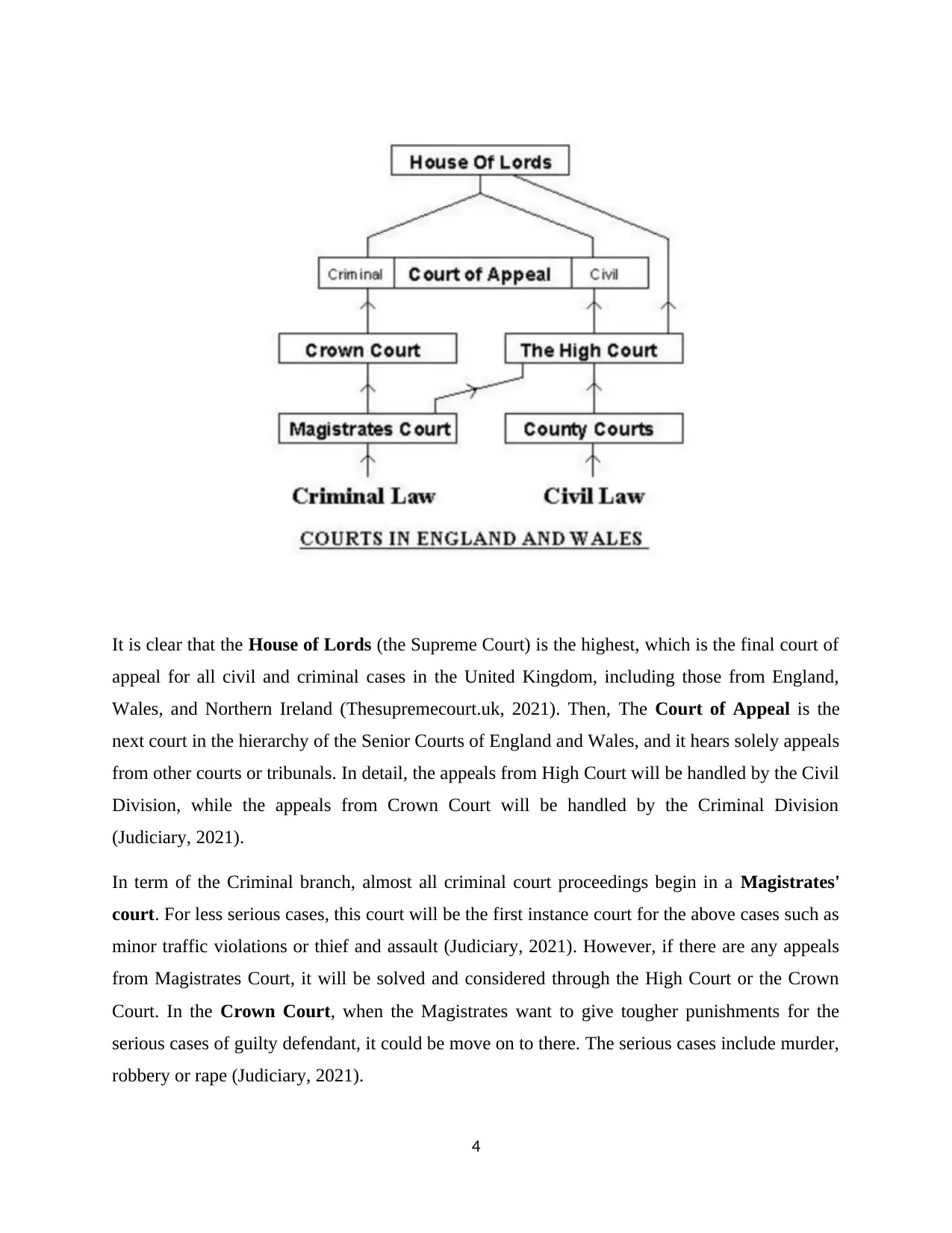
It is clear that the House of Lords (the Supreme Court) is the highest, which is the final court of
appeal for all civil and criminal cases in the United Kingdom, including those from England,
Wales, and Northern Ireland (Thesupremecourt.uk, 2021). Then, The Court of Appeal is the
next court in the hierarchy of the Senior Courts of England and Wales, and it hears solely appeals
from other courts or tribunals. In detail, the appeals from High Court will be handled by the Civil
Division, while the appeals from Crown Court will be handled by the Criminal Division
(Judiciary, 2021).
In term of the Criminal branch, almost all criminal court proceedings begin in a Magistrates'
court. For less serious cases, this court will be the first instance court for the above cases such as
minor traffic violations or thief and assault (Judiciary, 2021). However, if there are any appeals
from Magistrates Court, it will be solved and considered through the High Court or the Crown
Court. In the Crown Court, when the Magistrates want to give tougher punishments for the
serious cases of guilty defendant, it could be move on to there. The serious cases include murder,
robbery or rape (Judiciary, 2021).
4
appeal for all civil and criminal cases in the United Kingdom, including those from England,
Wales, and Northern Ireland (Thesupremecourt.uk, 2021). Then, The Court of Appeal is the
next court in the hierarchy of the Senior Courts of England and Wales, and it hears solely appeals
from other courts or tribunals. In detail, the appeals from High Court will be handled by the Civil
Division, while the appeals from Crown Court will be handled by the Criminal Division
(Judiciary, 2021).
In term of the Criminal branch, almost all criminal court proceedings begin in a Magistrates'
court. For less serious cases, this court will be the first instance court for the above cases such as
minor traffic violations or thief and assault (Judiciary, 2021). However, if there are any appeals
from Magistrates Court, it will be solved and considered through the High Court or the Crown
Court. In the Crown Court, when the Magistrates want to give tougher punishments for the
serious cases of guilty defendant, it could be move on to there. The serious cases include murder,
robbery or rape (Judiciary, 2021).
4
Paraphrase This Document
Need a fresh take? Get an instant paraphrase of this document with our AI Paraphraser
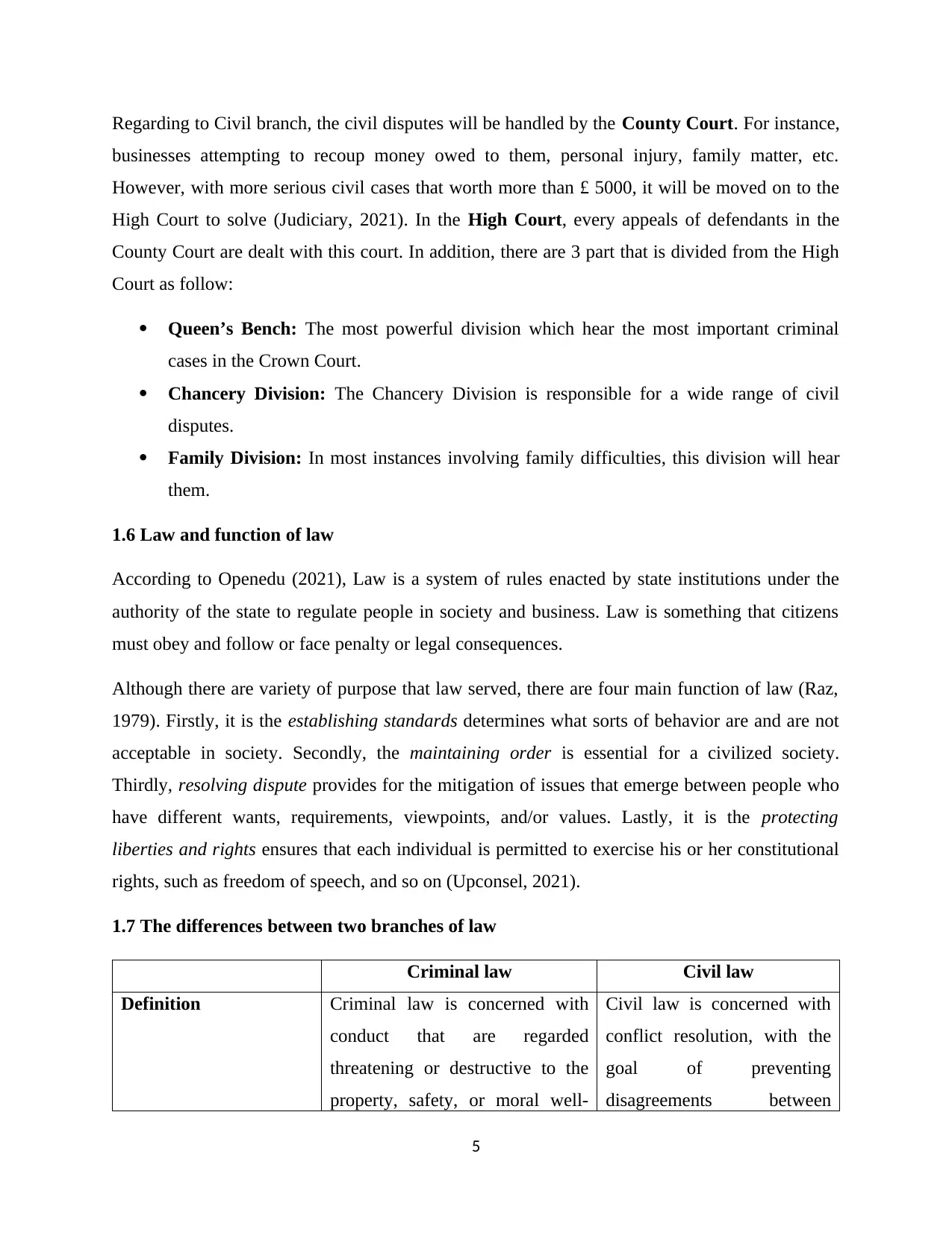
Regarding to Civil branch, the civil disputes will be handled by the County Court. For instance,
businesses attempting to recoup money owed to them, personal injury, family matter, etc.
However, with more serious civil cases that worth more than £ 5000, it will be moved on to the
High Court to solve (Judiciary, 2021). In the High Court, every appeals of defendants in the
County Court are dealt with this court. In addition, there are 3 part that is divided from the High
Court as follow:
Queen’s Bench: The most powerful division which hear the most important criminal
cases in the Crown Court.
Chancery Division: The Chancery Division is responsible for a wide range of civil
disputes.
Family Division: In most instances involving family difficulties, this division will hear
them.
1.6 Law and function of law
According to Openedu (2021), Law is a system of rules enacted by state institutions under the
authority of the state to regulate people in society and business. Law is something that citizens
must obey and follow or face penalty or legal consequences.
Although there are variety of purpose that law served, there are four main function of law (Raz,
1979). Firstly, it is the establishing standards determines what sorts of behavior are and are not
acceptable in society. Secondly, the maintaining order is essential for a civilized society.
Thirdly, resolving dispute provides for the mitigation of issues that emerge between people who
have different wants, requirements, viewpoints, and/or values. Lastly, it is the protecting
liberties and rights ensures that each individual is permitted to exercise his or her constitutional
rights, such as freedom of speech, and so on (Upconsel, 2021).
1.7 The differences between two branches of law
Criminal law Civil law
Definition Criminal law is concerned with
conduct that are regarded
threatening or destructive to the
property, safety, or moral well-
Civil law is concerned with
conflict resolution, with the
goal of preventing
disagreements between
5
businesses attempting to recoup money owed to them, personal injury, family matter, etc.
However, with more serious civil cases that worth more than £ 5000, it will be moved on to the
High Court to solve (Judiciary, 2021). In the High Court, every appeals of defendants in the
County Court are dealt with this court. In addition, there are 3 part that is divided from the High
Court as follow:
Queen’s Bench: The most powerful division which hear the most important criminal
cases in the Crown Court.
Chancery Division: The Chancery Division is responsible for a wide range of civil
disputes.
Family Division: In most instances involving family difficulties, this division will hear
them.
1.6 Law and function of law
According to Openedu (2021), Law is a system of rules enacted by state institutions under the
authority of the state to regulate people in society and business. Law is something that citizens
must obey and follow or face penalty or legal consequences.
Although there are variety of purpose that law served, there are four main function of law (Raz,
1979). Firstly, it is the establishing standards determines what sorts of behavior are and are not
acceptable in society. Secondly, the maintaining order is essential for a civilized society.
Thirdly, resolving dispute provides for the mitigation of issues that emerge between people who
have different wants, requirements, viewpoints, and/or values. Lastly, it is the protecting
liberties and rights ensures that each individual is permitted to exercise his or her constitutional
rights, such as freedom of speech, and so on (Upconsel, 2021).
1.7 The differences between two branches of law
Criminal law Civil law
Definition Criminal law is concerned with
conduct that are regarded
threatening or destructive to the
property, safety, or moral well-
Civil law is concerned with
conflict resolution, with the
goal of preventing
disagreements between
5
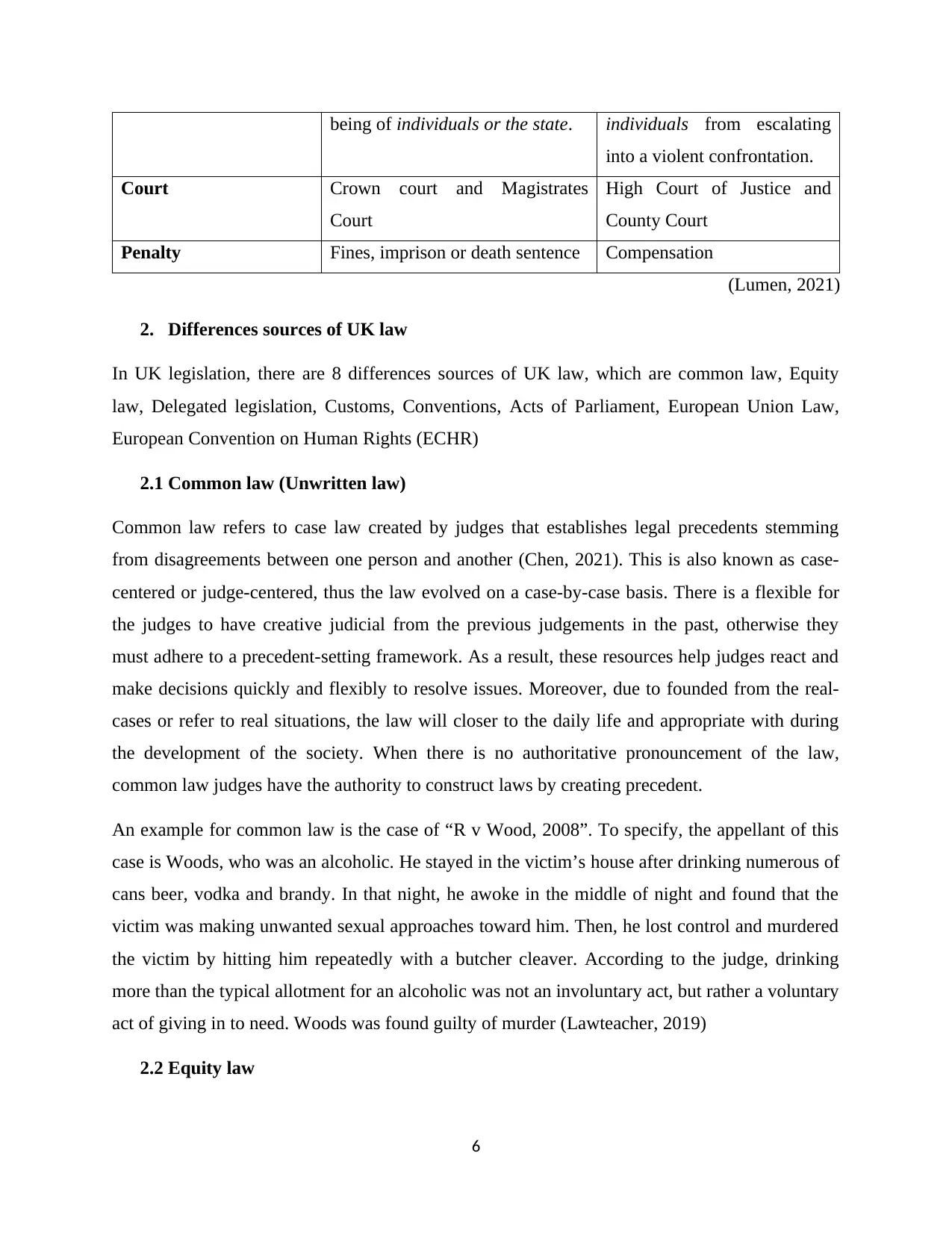
being of individuals or the state. individuals from escalating
into a violent confrontation.
Court Crown court and Magistrates
Court
High Court of Justice and
County Court
Penalty Fines, imprison or death sentence Compensation
(Lumen, 2021)
2. Differences sources of UK law
In UK legislation, there are 8 differences sources of UK law, which are common law, Equity
law, Delegated legislation, Customs, Conventions, Acts of Parliament, European Union Law,
European Convention on Human Rights (ECHR)
2.1 Common law (Unwritten law)
Common law refers to case law created by judges that establishes legal precedents stemming
from disagreements between one person and another (Chen, 2021). This is also known as case-
centered or judge-centered, thus the law evolved on a case-by-case basis. There is a flexible for
the judges to have creative judicial from the previous judgements in the past, otherwise they
must adhere to a precedent-setting framework. As a result, these resources help judges react and
make decisions quickly and flexibly to resolve issues. Moreover, due to founded from the real-
cases or refer to real situations, the law will closer to the daily life and appropriate with during
the development of the society. When there is no authoritative pronouncement of the law,
common law judges have the authority to construct laws by creating precedent.
An example for common law is the case of “R v Wood, 2008”. To specify, the appellant of this
case is Woods, who was an alcoholic. He stayed in the victim’s house after drinking numerous of
cans beer, vodka and brandy. In that night, he awoke in the middle of night and found that the
victim was making unwanted sexual approaches toward him. Then, he lost control and murdered
the victim by hitting him repeatedly with a butcher cleaver. According to the judge, drinking
more than the typical allotment for an alcoholic was not an involuntary act, but rather a voluntary
act of giving in to need. Woods was found guilty of murder (Lawteacher, 2019)
2.2 Equity law
6
into a violent confrontation.
Court Crown court and Magistrates
Court
High Court of Justice and
County Court
Penalty Fines, imprison or death sentence Compensation
(Lumen, 2021)
2. Differences sources of UK law
In UK legislation, there are 8 differences sources of UK law, which are common law, Equity
law, Delegated legislation, Customs, Conventions, Acts of Parliament, European Union Law,
European Convention on Human Rights (ECHR)
2.1 Common law (Unwritten law)
Common law refers to case law created by judges that establishes legal precedents stemming
from disagreements between one person and another (Chen, 2021). This is also known as case-
centered or judge-centered, thus the law evolved on a case-by-case basis. There is a flexible for
the judges to have creative judicial from the previous judgements in the past, otherwise they
must adhere to a precedent-setting framework. As a result, these resources help judges react and
make decisions quickly and flexibly to resolve issues. Moreover, due to founded from the real-
cases or refer to real situations, the law will closer to the daily life and appropriate with during
the development of the society. When there is no authoritative pronouncement of the law,
common law judges have the authority to construct laws by creating precedent.
An example for common law is the case of “R v Wood, 2008”. To specify, the appellant of this
case is Woods, who was an alcoholic. He stayed in the victim’s house after drinking numerous of
cans beer, vodka and brandy. In that night, he awoke in the middle of night and found that the
victim was making unwanted sexual approaches toward him. Then, he lost control and murdered
the victim by hitting him repeatedly with a butcher cleaver. According to the judge, drinking
more than the typical allotment for an alcoholic was not an involuntary act, but rather a voluntary
act of giving in to need. Woods was found guilty of murder (Lawteacher, 2019)
2.2 Equity law
6
⊘ This is a preview!⊘
Do you want full access?
Subscribe today to unlock all pages.

Trusted by 1+ million students worldwide
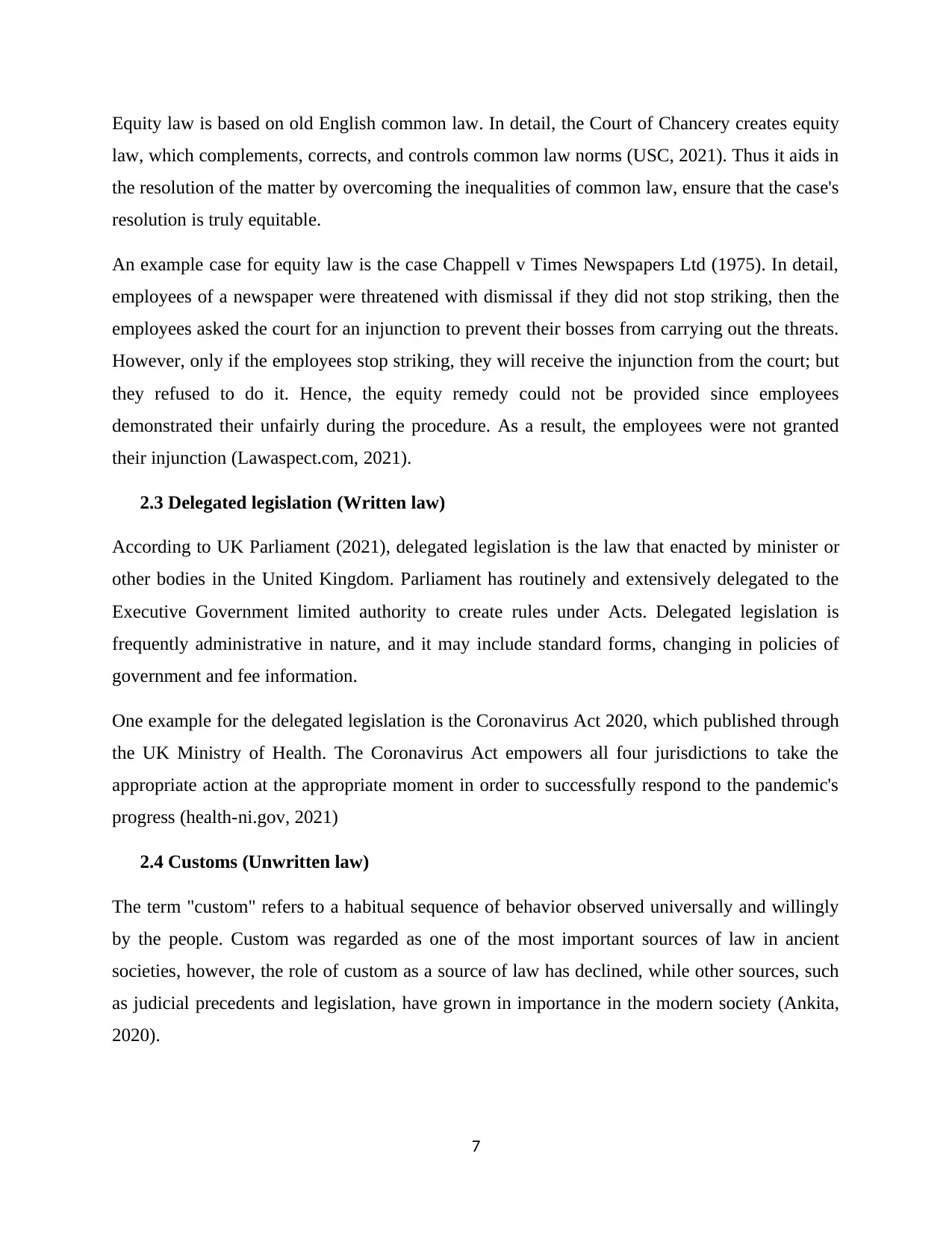
Equity law is based on old English common law. In detail, the Court of Chancery creates equity
law, which complements, corrects, and controls common law norms (USC, 2021). Thus it aids in
the resolution of the matter by overcoming the inequalities of common law, ensure that the case's
resolution is truly equitable.
An example case for equity law is the case Chappell v Times Newspapers Ltd (1975). In detail,
employees of a newspaper were threatened with dismissal if they did not stop striking, then the
employees asked the court for an injunction to prevent their bosses from carrying out the threats.
However, only if the employees stop striking, they will receive the injunction from the court; but
they refused to do it. Hence, the equity remedy could not be provided since employees
demonstrated their unfairly during the procedure. As a result, the employees were not granted
their injunction (Lawaspect.com, 2021).
2.3 Delegated legislation (Written law)
According to UK Parliament (2021), delegated legislation is the law that enacted by minister or
other bodies in the United Kingdom. Parliament has routinely and extensively delegated to the
Executive Government limited authority to create rules under Acts. Delegated legislation is
frequently administrative in nature, and it may include standard forms, changing in policies of
government and fee information.
One example for the delegated legislation is the Coronavirus Act 2020, which published through
the UK Ministry of Health. The Coronavirus Act empowers all four jurisdictions to take the
appropriate action at the appropriate moment in order to successfully respond to the pandemic's
progress (health-ni.gov, 2021)
2.4 Customs (Unwritten law)
The term "custom" refers to a habitual sequence of behavior observed universally and willingly
by the people. Custom was regarded as one of the most important sources of law in ancient
societies, however, the role of custom as a source of law has declined, while other sources, such
as judicial precedents and legislation, have grown in importance in the modern society (Ankita,
2020).
7
law, which complements, corrects, and controls common law norms (USC, 2021). Thus it aids in
the resolution of the matter by overcoming the inequalities of common law, ensure that the case's
resolution is truly equitable.
An example case for equity law is the case Chappell v Times Newspapers Ltd (1975). In detail,
employees of a newspaper were threatened with dismissal if they did not stop striking, then the
employees asked the court for an injunction to prevent their bosses from carrying out the threats.
However, only if the employees stop striking, they will receive the injunction from the court; but
they refused to do it. Hence, the equity remedy could not be provided since employees
demonstrated their unfairly during the procedure. As a result, the employees were not granted
their injunction (Lawaspect.com, 2021).
2.3 Delegated legislation (Written law)
According to UK Parliament (2021), delegated legislation is the law that enacted by minister or
other bodies in the United Kingdom. Parliament has routinely and extensively delegated to the
Executive Government limited authority to create rules under Acts. Delegated legislation is
frequently administrative in nature, and it may include standard forms, changing in policies of
government and fee information.
One example for the delegated legislation is the Coronavirus Act 2020, which published through
the UK Ministry of Health. The Coronavirus Act empowers all four jurisdictions to take the
appropriate action at the appropriate moment in order to successfully respond to the pandemic's
progress (health-ni.gov, 2021)
2.4 Customs (Unwritten law)
The term "custom" refers to a habitual sequence of behavior observed universally and willingly
by the people. Custom was regarded as one of the most important sources of law in ancient
societies, however, the role of custom as a source of law has declined, while other sources, such
as judicial precedents and legislation, have grown in importance in the modern society (Ankita,
2020).
7
Paraphrase This Document
Need a fresh take? Get an instant paraphrase of this document with our AI Paraphraser
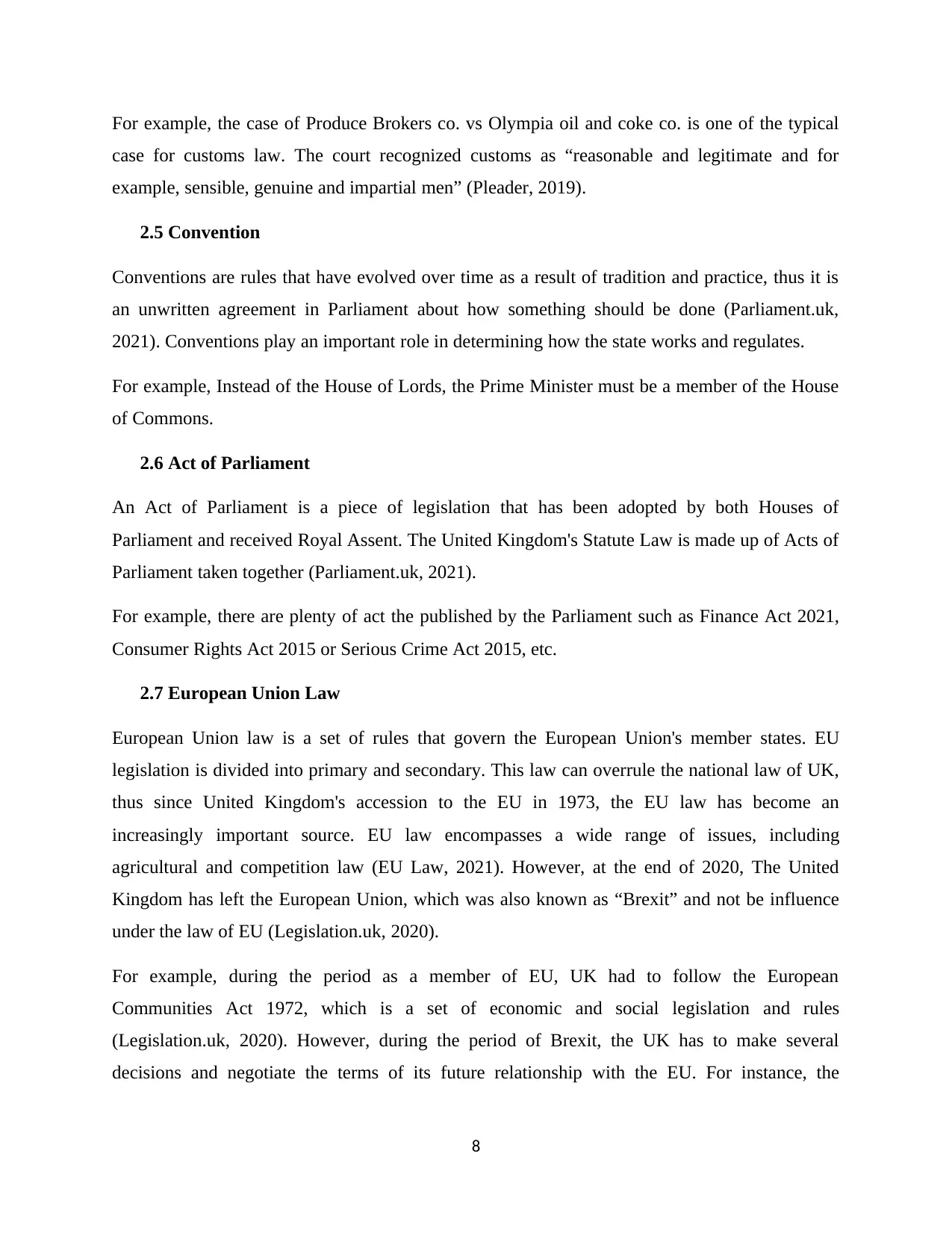
For example, the case of Produce Brokers co. vs Olympia oil and coke co. is one of the typical
case for customs law. The court recognized customs as “reasonable and legitimate and for
example, sensible, genuine and impartial men” (Pleader, 2019).
2.5 Convention
Conventions are rules that have evolved over time as a result of tradition and practice, thus it is
an unwritten agreement in Parliament about how something should be done (Parliament.uk,
2021). Conventions play an important role in determining how the state works and regulates.
For example, Instead of the House of Lords, the Prime Minister must be a member of the House
of Commons.
2.6 Act of Parliament
An Act of Parliament is a piece of legislation that has been adopted by both Houses of
Parliament and received Royal Assent. The United Kingdom's Statute Law is made up of Acts of
Parliament taken together (Parliament.uk, 2021).
For example, there are plenty of act the published by the Parliament such as Finance Act 2021,
Consumer Rights Act 2015 or Serious Crime Act 2015, etc.
2.7 European Union Law
European Union law is a set of rules that govern the European Union's member states. EU
legislation is divided into primary and secondary. This law can overrule the national law of UK,
thus since United Kingdom's accession to the EU in 1973, the EU law has become an
increasingly important source. EU law encompasses a wide range of issues, including
agricultural and competition law (EU Law, 2021). However, at the end of 2020, The United
Kingdom has left the European Union, which was also known as “Brexit” and not be influence
under the law of EU (Legislation.uk, 2020).
For example, during the period as a member of EU, UK had to follow the European
Communities Act 1972, which is a set of economic and social legislation and rules
(Legislation.uk, 2020). However, during the period of Brexit, the UK has to make several
decisions and negotiate the terms of its future relationship with the EU. For instance, the
8
case for customs law. The court recognized customs as “reasonable and legitimate and for
example, sensible, genuine and impartial men” (Pleader, 2019).
2.5 Convention
Conventions are rules that have evolved over time as a result of tradition and practice, thus it is
an unwritten agreement in Parliament about how something should be done (Parliament.uk,
2021). Conventions play an important role in determining how the state works and regulates.
For example, Instead of the House of Lords, the Prime Minister must be a member of the House
of Commons.
2.6 Act of Parliament
An Act of Parliament is a piece of legislation that has been adopted by both Houses of
Parliament and received Royal Assent. The United Kingdom's Statute Law is made up of Acts of
Parliament taken together (Parliament.uk, 2021).
For example, there are plenty of act the published by the Parliament such as Finance Act 2021,
Consumer Rights Act 2015 or Serious Crime Act 2015, etc.
2.7 European Union Law
European Union law is a set of rules that govern the European Union's member states. EU
legislation is divided into primary and secondary. This law can overrule the national law of UK,
thus since United Kingdom's accession to the EU in 1973, the EU law has become an
increasingly important source. EU law encompasses a wide range of issues, including
agricultural and competition law (EU Law, 2021). However, at the end of 2020, The United
Kingdom has left the European Union, which was also known as “Brexit” and not be influence
under the law of EU (Legislation.uk, 2020).
For example, during the period as a member of EU, UK had to follow the European
Communities Act 1972, which is a set of economic and social legislation and rules
(Legislation.uk, 2020). However, during the period of Brexit, the UK has to make several
decisions and negotiate the terms of its future relationship with the EU. For instance, the
8
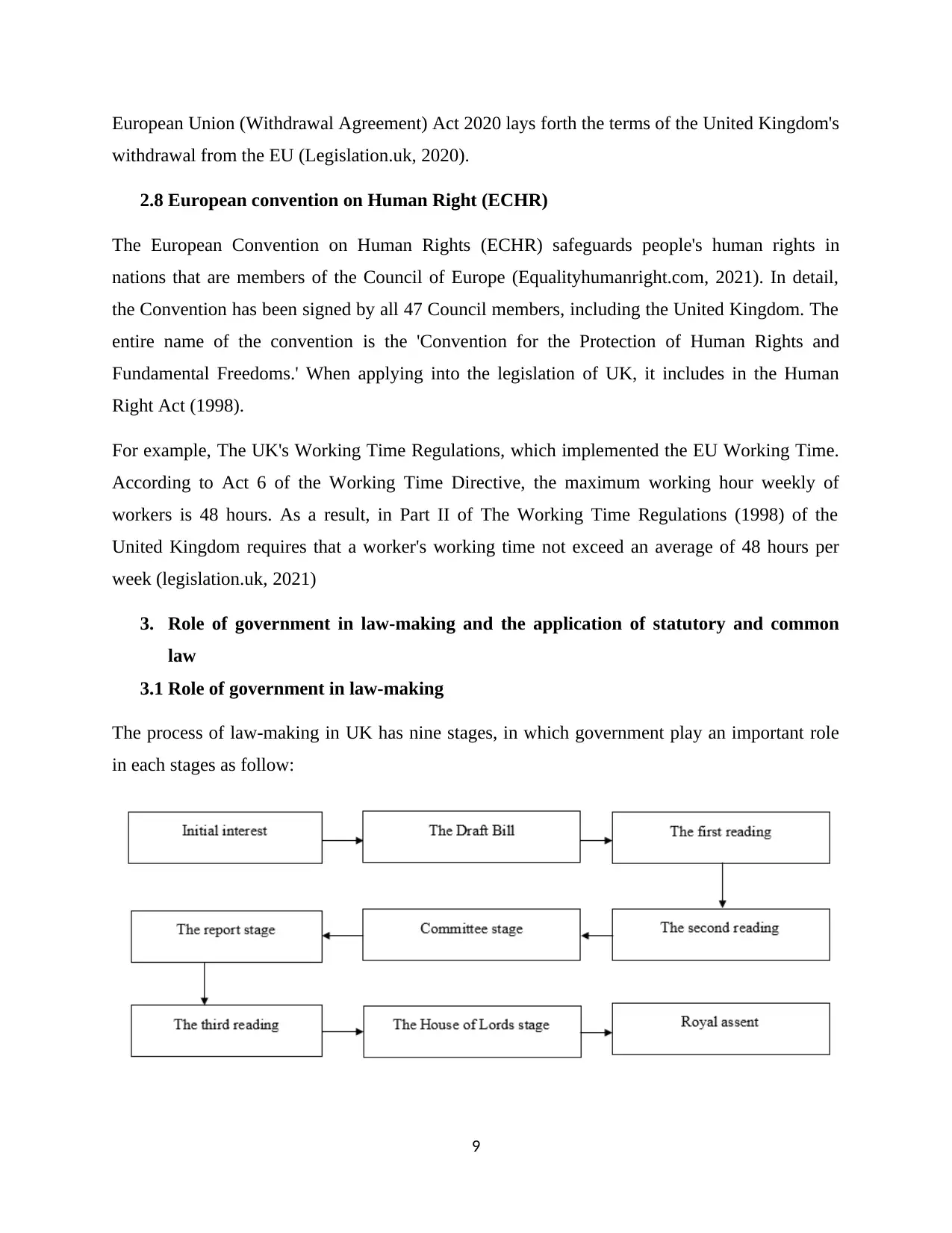
European Union (Withdrawal Agreement) Act 2020 lays forth the terms of the United Kingdom's
withdrawal from the EU (Legislation.uk, 2020).
2.8 European convention on Human Right (ECHR)
The European Convention on Human Rights (ECHR) safeguards people's human rights in
nations that are members of the Council of Europe (Equalityhumanright.com, 2021). In detail,
the Convention has been signed by all 47 Council members, including the United Kingdom. The
entire name of the convention is the 'Convention for the Protection of Human Rights and
Fundamental Freedoms.' When applying into the legislation of UK, it includes in the Human
Right Act (1998).
For example, The UK's Working Time Regulations, which implemented the EU Working Time.
According to Act 6 of the Working Time Directive, the maximum working hour weekly of
workers is 48 hours. As a result, in Part II of The Working Time Regulations (1998) of the
United Kingdom requires that a worker's working time not exceed an average of 48 hours per
week (legislation.uk, 2021)
3. Role of government in law-making and the application of statutory and common
law
3.1 Role of government in law-making
The process of law-making in UK has nine stages, in which government play an important role
in each stages as follow:
9
withdrawal from the EU (Legislation.uk, 2020).
2.8 European convention on Human Right (ECHR)
The European Convention on Human Rights (ECHR) safeguards people's human rights in
nations that are members of the Council of Europe (Equalityhumanright.com, 2021). In detail,
the Convention has been signed by all 47 Council members, including the United Kingdom. The
entire name of the convention is the 'Convention for the Protection of Human Rights and
Fundamental Freedoms.' When applying into the legislation of UK, it includes in the Human
Right Act (1998).
For example, The UK's Working Time Regulations, which implemented the EU Working Time.
According to Act 6 of the Working Time Directive, the maximum working hour weekly of
workers is 48 hours. As a result, in Part II of The Working Time Regulations (1998) of the
United Kingdom requires that a worker's working time not exceed an average of 48 hours per
week (legislation.uk, 2021)
3. Role of government in law-making and the application of statutory and common
law
3.1 Role of government in law-making
The process of law-making in UK has nine stages, in which government play an important role
in each stages as follow:
9
⊘ This is a preview!⊘
Do you want full access?
Subscribe today to unlock all pages.

Trusted by 1+ million students worldwide
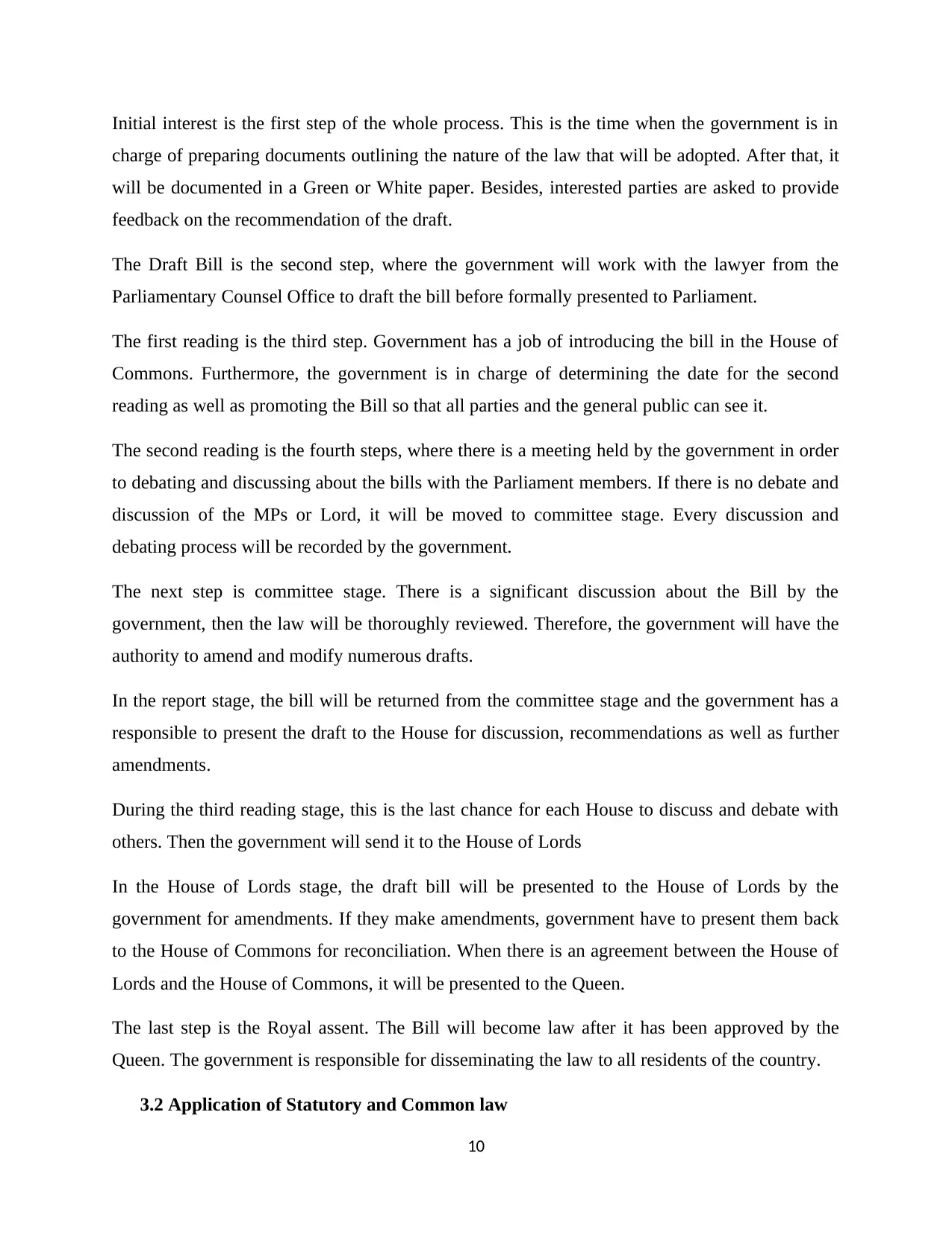
Initial interest is the first step of the whole process. This is the time when the government is in
charge of preparing documents outlining the nature of the law that will be adopted. After that, it
will be documented in a Green or White paper. Besides, interested parties are asked to provide
feedback on the recommendation of the draft.
The Draft Bill is the second step, where the government will work with the lawyer from the
Parliamentary Counsel Office to draft the bill before formally presented to Parliament.
The first reading is the third step. Government has a job of introducing the bill in the House of
Commons. Furthermore, the government is in charge of determining the date for the second
reading as well as promoting the Bill so that all parties and the general public can see it.
The second reading is the fourth steps, where there is a meeting held by the government in order
to debating and discussing about the bills with the Parliament members. If there is no debate and
discussion of the MPs or Lord, it will be moved to committee stage. Every discussion and
debating process will be recorded by the government.
The next step is committee stage. There is a significant discussion about the Bill by the
government, then the law will be thoroughly reviewed. Therefore, the government will have the
authority to amend and modify numerous drafts.
In the report stage, the bill will be returned from the committee stage and the government has a
responsible to present the draft to the House for discussion, recommendations as well as further
amendments.
During the third reading stage, this is the last chance for each House to discuss and debate with
others. Then the government will send it to the House of Lords
In the House of Lords stage, the draft bill will be presented to the House of Lords by the
government for amendments. If they make amendments, government have to present them back
to the House of Commons for reconciliation. When there is an agreement between the House of
Lords and the House of Commons, it will be presented to the Queen.
The last step is the Royal assent. The Bill will become law after it has been approved by the
Queen. The government is responsible for disseminating the law to all residents of the country.
3.2 Application of Statutory and Common law
10
charge of preparing documents outlining the nature of the law that will be adopted. After that, it
will be documented in a Green or White paper. Besides, interested parties are asked to provide
feedback on the recommendation of the draft.
The Draft Bill is the second step, where the government will work with the lawyer from the
Parliamentary Counsel Office to draft the bill before formally presented to Parliament.
The first reading is the third step. Government has a job of introducing the bill in the House of
Commons. Furthermore, the government is in charge of determining the date for the second
reading as well as promoting the Bill so that all parties and the general public can see it.
The second reading is the fourth steps, where there is a meeting held by the government in order
to debating and discussing about the bills with the Parliament members. If there is no debate and
discussion of the MPs or Lord, it will be moved to committee stage. Every discussion and
debating process will be recorded by the government.
The next step is committee stage. There is a significant discussion about the Bill by the
government, then the law will be thoroughly reviewed. Therefore, the government will have the
authority to amend and modify numerous drafts.
In the report stage, the bill will be returned from the committee stage and the government has a
responsible to present the draft to the House for discussion, recommendations as well as further
amendments.
During the third reading stage, this is the last chance for each House to discuss and debate with
others. Then the government will send it to the House of Lords
In the House of Lords stage, the draft bill will be presented to the House of Lords by the
government for amendments. If they make amendments, government have to present them back
to the House of Commons for reconciliation. When there is an agreement between the House of
Lords and the House of Commons, it will be presented to the Queen.
The last step is the Royal assent. The Bill will become law after it has been approved by the
Queen. The government is responsible for disseminating the law to all residents of the country.
3.2 Application of Statutory and Common law
10
Paraphrase This Document
Need a fresh take? Get an instant paraphrase of this document with our AI Paraphraser
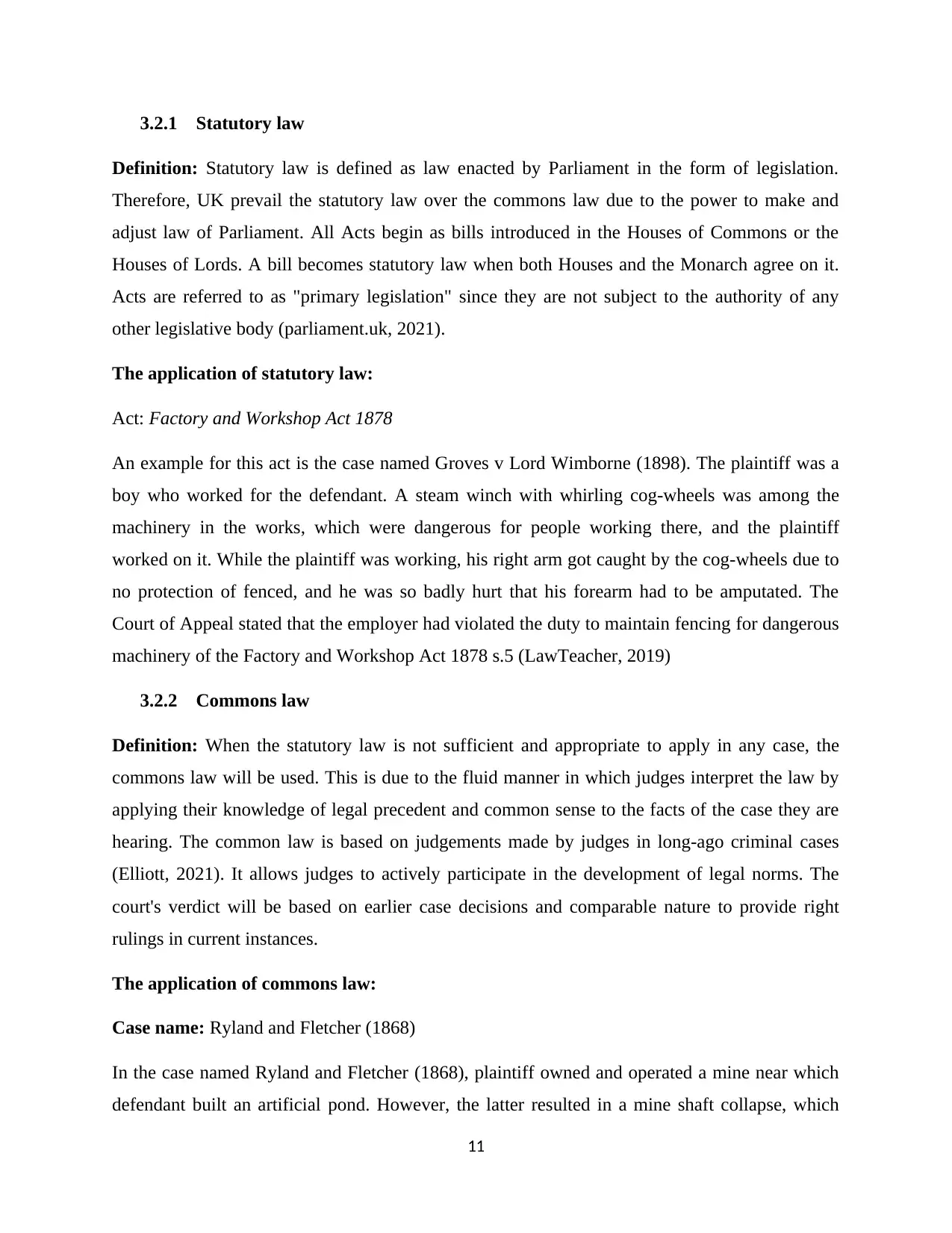
3.2.1 Statutory law
Definition: Statutory law is defined as law enacted by Parliament in the form of legislation.
Therefore, UK prevail the statutory law over the commons law due to the power to make and
adjust law of Parliament. All Acts begin as bills introduced in the Houses of Commons or the
Houses of Lords. A bill becomes statutory law when both Houses and the Monarch agree on it.
Acts are referred to as "primary legislation" since they are not subject to the authority of any
other legislative body (parliament.uk, 2021).
The application of statutory law:
Act: Factory and Workshop Act 1878
An example for this act is the case named Groves v Lord Wimborne (1898). The plaintiff was a
boy who worked for the defendant. A steam winch with whirling cog-wheels was among the
machinery in the works, which were dangerous for people working there, and the plaintiff
worked on it. While the plaintiff was working, his right arm got caught by the cog-wheels due to
no protection of fenced, and he was so badly hurt that his forearm had to be amputated. The
Court of Appeal stated that the employer had violated the duty to maintain fencing for dangerous
machinery of the Factory and Workshop Act 1878 s.5 (LawTeacher, 2019)
3.2.2 Commons law
Definition: When the statutory law is not sufficient and appropriate to apply in any case, the
commons law will be used. This is due to the fluid manner in which judges interpret the law by
applying their knowledge of legal precedent and common sense to the facts of the case they are
hearing. The common law is based on judgements made by judges in long-ago criminal cases
(Elliott, 2021). It allows judges to actively participate in the development of legal norms. The
court's verdict will be based on earlier case decisions and comparable nature to provide right
rulings in current instances.
The application of commons law:
Case name: Ryland and Fletcher (1868)
In the case named Ryland and Fletcher (1868), plaintiff owned and operated a mine near which
defendant built an artificial pond. However, the latter resulted in a mine shaft collapse, which
11
Definition: Statutory law is defined as law enacted by Parliament in the form of legislation.
Therefore, UK prevail the statutory law over the commons law due to the power to make and
adjust law of Parliament. All Acts begin as bills introduced in the Houses of Commons or the
Houses of Lords. A bill becomes statutory law when both Houses and the Monarch agree on it.
Acts are referred to as "primary legislation" since they are not subject to the authority of any
other legislative body (parliament.uk, 2021).
The application of statutory law:
Act: Factory and Workshop Act 1878
An example for this act is the case named Groves v Lord Wimborne (1898). The plaintiff was a
boy who worked for the defendant. A steam winch with whirling cog-wheels was among the
machinery in the works, which were dangerous for people working there, and the plaintiff
worked on it. While the plaintiff was working, his right arm got caught by the cog-wheels due to
no protection of fenced, and he was so badly hurt that his forearm had to be amputated. The
Court of Appeal stated that the employer had violated the duty to maintain fencing for dangerous
machinery of the Factory and Workshop Act 1878 s.5 (LawTeacher, 2019)
3.2.2 Commons law
Definition: When the statutory law is not sufficient and appropriate to apply in any case, the
commons law will be used. This is due to the fluid manner in which judges interpret the law by
applying their knowledge of legal precedent and common sense to the facts of the case they are
hearing. The common law is based on judgements made by judges in long-ago criminal cases
(Elliott, 2021). It allows judges to actively participate in the development of legal norms. The
court's verdict will be based on earlier case decisions and comparable nature to provide right
rulings in current instances.
The application of commons law:
Case name: Ryland and Fletcher (1868)
In the case named Ryland and Fletcher (1868), plaintiff owned and operated a mine near which
defendant built an artificial pond. However, the latter resulted in a mine shaft collapse, which
11
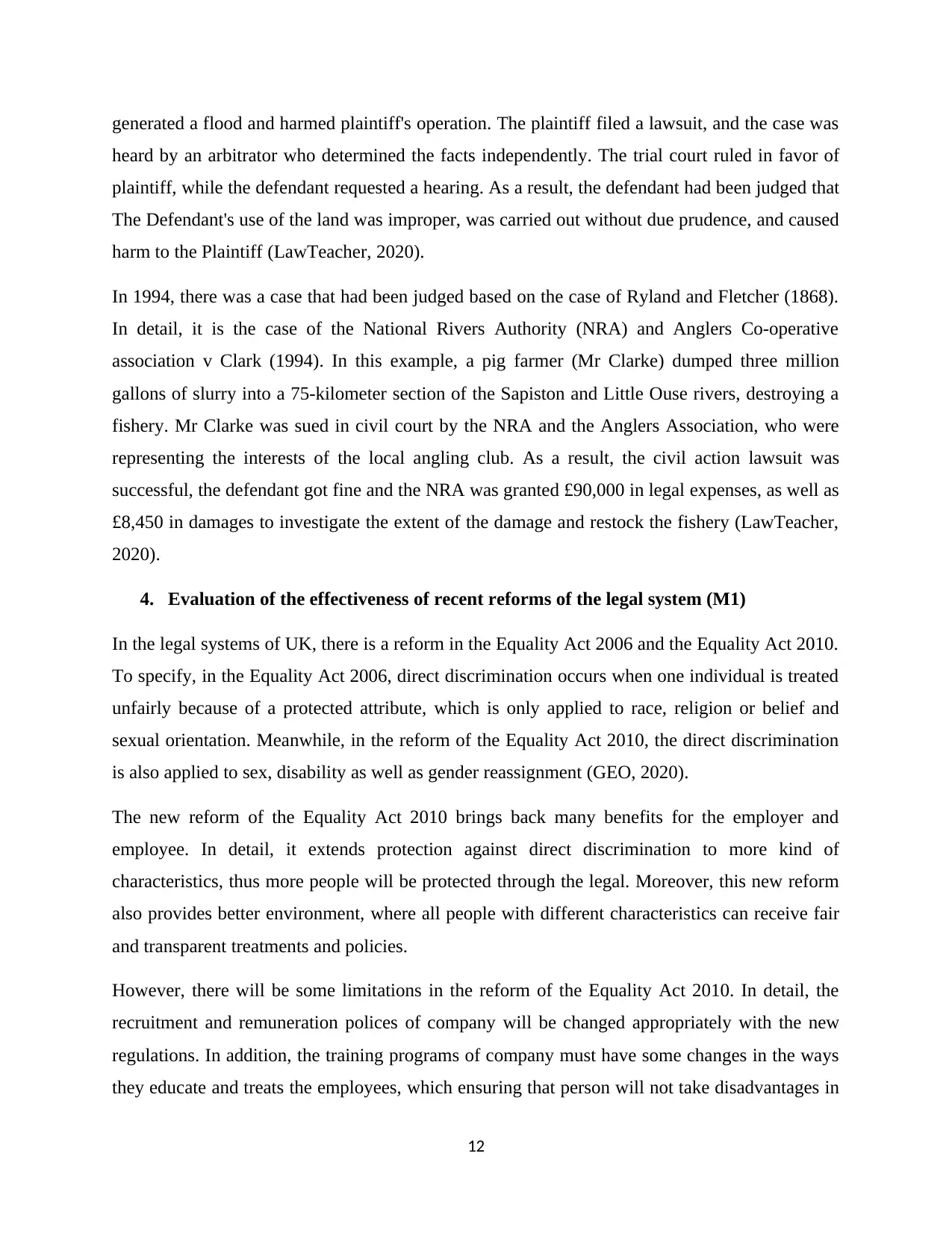
generated a flood and harmed plaintiff's operation. The plaintiff filed a lawsuit, and the case was
heard by an arbitrator who determined the facts independently. The trial court ruled in favor of
plaintiff, while the defendant requested a hearing. As a result, the defendant had been judged that
The Defendant's use of the land was improper, was carried out without due prudence, and caused
harm to the Plaintiff (LawTeacher, 2020).
In 1994, there was a case that had been judged based on the case of Ryland and Fletcher (1868).
In detail, it is the case of the National Rivers Authority (NRA) and Anglers Co-operative
association v Clark (1994). In this example, a pig farmer (Mr Clarke) dumped three million
gallons of slurry into a 75-kilometer section of the Sapiston and Little Ouse rivers, destroying a
fishery. Mr Clarke was sued in civil court by the NRA and the Anglers Association, who were
representing the interests of the local angling club. As a result, the civil action lawsuit was
successful, the defendant got fine and the NRA was granted £90,000 in legal expenses, as well as
£8,450 in damages to investigate the extent of the damage and restock the fishery (LawTeacher,
2020).
4. Evaluation of the effectiveness of recent reforms of the legal system (M1)
In the legal systems of UK, there is a reform in the Equality Act 2006 and the Equality Act 2010.
To specify, in the Equality Act 2006, direct discrimination occurs when one individual is treated
unfairly because of a protected attribute, which is only applied to race, religion or belief and
sexual orientation. Meanwhile, in the reform of the Equality Act 2010, the direct discrimination
is also applied to sex, disability as well as gender reassignment (GEO, 2020).
The new reform of the Equality Act 2010 brings back many benefits for the employer and
employee. In detail, it extends protection against direct discrimination to more kind of
characteristics, thus more people will be protected through the legal. Moreover, this new reform
also provides better environment, where all people with different characteristics can receive fair
and transparent treatments and policies.
However, there will be some limitations in the reform of the Equality Act 2010. In detail, the
recruitment and remuneration polices of company will be changed appropriately with the new
regulations. In addition, the training programs of company must have some changes in the ways
they educate and treats the employees, which ensuring that person will not take disadvantages in
12
heard by an arbitrator who determined the facts independently. The trial court ruled in favor of
plaintiff, while the defendant requested a hearing. As a result, the defendant had been judged that
The Defendant's use of the land was improper, was carried out without due prudence, and caused
harm to the Plaintiff (LawTeacher, 2020).
In 1994, there was a case that had been judged based on the case of Ryland and Fletcher (1868).
In detail, it is the case of the National Rivers Authority (NRA) and Anglers Co-operative
association v Clark (1994). In this example, a pig farmer (Mr Clarke) dumped three million
gallons of slurry into a 75-kilometer section of the Sapiston and Little Ouse rivers, destroying a
fishery. Mr Clarke was sued in civil court by the NRA and the Anglers Association, who were
representing the interests of the local angling club. As a result, the civil action lawsuit was
successful, the defendant got fine and the NRA was granted £90,000 in legal expenses, as well as
£8,450 in damages to investigate the extent of the damage and restock the fishery (LawTeacher,
2020).
4. Evaluation of the effectiveness of recent reforms of the legal system (M1)
In the legal systems of UK, there is a reform in the Equality Act 2006 and the Equality Act 2010.
To specify, in the Equality Act 2006, direct discrimination occurs when one individual is treated
unfairly because of a protected attribute, which is only applied to race, religion or belief and
sexual orientation. Meanwhile, in the reform of the Equality Act 2010, the direct discrimination
is also applied to sex, disability as well as gender reassignment (GEO, 2020).
The new reform of the Equality Act 2010 brings back many benefits for the employer and
employee. In detail, it extends protection against direct discrimination to more kind of
characteristics, thus more people will be protected through the legal. Moreover, this new reform
also provides better environment, where all people with different characteristics can receive fair
and transparent treatments and policies.
However, there will be some limitations in the reform of the Equality Act 2010. In detail, the
recruitment and remuneration polices of company will be changed appropriately with the new
regulations. In addition, the training programs of company must have some changes in the ways
they educate and treats the employees, which ensuring that person will not take disadvantages in
12
⊘ This is a preview!⊘
Do you want full access?
Subscribe today to unlock all pages.

Trusted by 1+ million students worldwide
1 out of 25
Related Documents
Your All-in-One AI-Powered Toolkit for Academic Success.
+13062052269
info@desklib.com
Available 24*7 on WhatsApp / Email
![[object Object]](/_next/static/media/star-bottom.7253800d.svg)
Unlock your academic potential
Copyright © 2020–2025 A2Z Services. All Rights Reserved. Developed and managed by ZUCOL.





